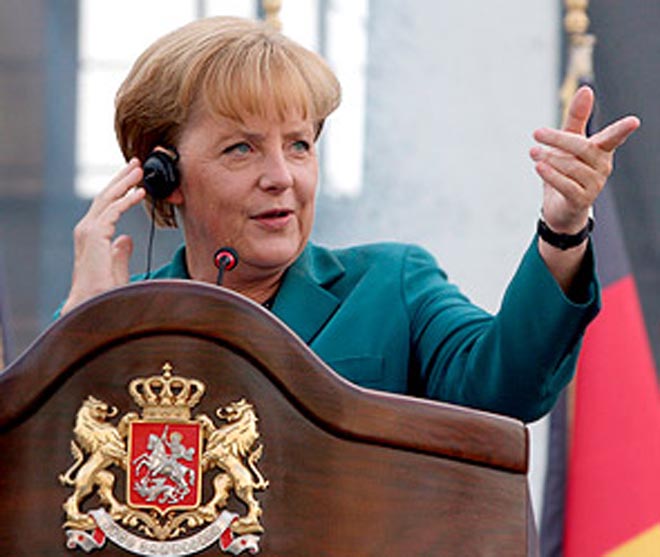Chancellor Angela Merkel said Tuesday that the world should reserve judgment on whether civilians were killed in a German-ordered airstrike in Afghanistan, even as NATO said it believed that civilians had died in the attack, Associated Press reported.
The NATO-led force announced that it believed after a preliminary review that civilians had been killed and wounded along with insurgents in the strike last week on two hijacked tanker trucks in the northern province of Kunduz. It said the top U.S. and NATO commander in Afghanistan, Gen. Stanley McChrystal, had appointed a Canadian major general to lead an investigation along with officers from the U.S. Air Force and German military.
Merkel asserted in a nearly simultaneous speech to Germany's parliament that reports about civilian victims were still contradictory.
"It will not be possible for us to clear that up precisely here this morning," she said. "We will not accept premature judgments."
Merkel said she had given the same message to NATO Secretary-General Anders Fogh Rasmussen.
"I say this very clearly after what I have experienced in the last few days: I will not tolerate that from whoever it may be, at home as well as abroad," she told parliament.
She did not address any details of the airstrike or the events that led to it.
Merkel pledged German support for a thorough investigation of the airstrike and did not discount the possibility that civilians had been killed.
"We will not gloss over anything," she told lawmakers. "Every innocent person who dies in Afghanistan is one too many - we mourn every single one."
McChrystal ordered commanders in June to be sure any targets were clear of civilians before calling in an airstrike, hoping to reduce the growing number of Afghan civilian deaths, which have damaged the credibility of international troops.
Germany had been one of the harshest critics of using airstrikes as part of the mission. But a recent jump in attacks on their troops have resulted in a change in tactics. Earlier this year the government changed the army's rules of engagement, allowing them to open fire, instead of waiting to be attacked.
Germany has been criticized by some of its NATO partners for calling in Friday's strike by a U.S. jet and for initially insisting that it appeared only militants were among the dozens who died. Only later did Germany officials acknowledge that civilians might have been killed.
German officials have backed their commanders since the airstrike, citing worries that the tankers could have been used in a suicide attack against their troops.
The Afghan government's director of criminal investigation, Mirza Mohammad Yarmand, told reporters on Tuesday the Taliban hijacked the tankers "to use as a rolling bomb against the government or government forces.
"Or they would have sold the gas in the tankers to fund their equipment and ammunition," he said.
The 4,200-troop German mission in Afghanistan has become increasingly unpopular at home, with polls showing a majority now opposed. But the airstrike does not appear to be poised to affect a Sept. 27 national election. Public outcry has been muted and none of the main political parties have wavered in their support of the mission.
Merkel said the Afghan mission remains necessary and helps protect "the life and limb of people here in Germany against the evil of international terrorism."






